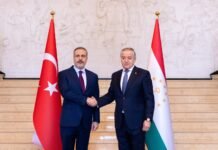Turkey’s main opposition Republican People’s Party (CHP) deputy Sezgin Tanrıkulu has submitted a parliamentary question and asked Turkish Prime Minister Binali Yıldırım about the reasons behind the detentions of human rights defenders in İstanbul.
Stating that “the human rights defenders’ activities were open to public,” Tanrıkulu said in his parliamentary question that “They are all members of associations that were founded within the law and their activities are open to public. The reasons behind their detentions are unknown due to the confidentiality order.”
Ten human rights defenders were detained on July 5, 2016 at a conference on İstanbul’s Büyükada Island, prompting outrage among human rights groups and calls for the authorities to release them. “On which grounds were they detained? What’s the reason behind detaining them in such secrecy? Are the allegations regarding the activists being kept in different police posts true? If true, what’s the reason for it?” Tanrıkulu said.
Meanwhile Amnesty International (AI) has launched an “urgent action” campaign concerning the 10 human rights advocates. In its campaign, the Amnesty called for “immediate and unconditional release” of the rights defenders. AI stated that “Arbitrary detentions are legally forbidden. Right to not being arbitrarily detained is acknowledged in Article 9 of the International Covenant on Social and Political Rights of which Turkey is a part also.”
İdil Eser, the director of Amnesty International’s Turkey office, İlknur Üstün from the Women’s Coalition, Günal Kurşun and Veli Acu from the Human Rights Agenda Association, Nalan Erkem and Özlem Dalkıran from the Citizen’s Assembly, Nejat Taştan from the Association for Monitoring Equal Rights, lawyer Şeyhmuz Özbekli, activist Peter Steudtner and moderator Ali Garawi were all detained during the July 5 meeting. The prosecutor has issued a 14-day detention them.
Amnesty International (AI) Turkey Director İdil Eser has sent a letter via her lawyer, saying “she feels at peace for being on the side of human rights and what’s right.” Eser said in her letter that “I have committed no crime other than defending human rights regardless of the identity of those in need. Everyone needs human rights, law and justice.”
Describing her situation as too absurd to be true, Eser wrote in her letter: “I have not committed any crime other than defending human rights without looking at victims’ identities. Everybody will need human rights, law and justice one day. I found myself in unlawfulness, in a nightmare that is too absurd even for Aziz Nesin [a Turkish satirist and writer] to imagine, but I am at peace due to standing up for human rights and what is right. I want to believe that before this surreal picture turns into a lynching atmosphere, the truth will come out, that law and justice will prevail and that I will continue my work where I left off.”
Eser, who started working for AI Turkey a year ago, said she was working there so that nobody would have to experience the legal absurdity that she is experiencing.
“The reason I wanted to work at this job was because I knew the end of countries that showed no respect for human rights from examples throughout history and believed in the significance of working for rights,” said Eser.
The detentions came less than a month after a court imprisoned the chairman of Amnesty’s Turkey branch pending trial, Taner Kılıç, on charges of “membership of a terrorist organization.” Turkish government has used alleged and fabricated “terror” charges and alleged coup involvement as pretext to detain and arrest tens of thousands people including human rights activists, journalists, judges, prosecutors, teachers, academicians, shoopkepers, public servants and even housewives since a controversial coup attempt on July 15, 2016.
The controversial military coup attempt on July 15 killed over 240 people. Immediately after the putsch, the Justice and Development Party (AKP) government along with Erdoğan pinned the blame on the Gülen movement.
Fethullah Gülen, who inspired the movement, strongly denied having any role in the failed coup and called for an international investigation into it, but President Erdoğan — calling the coup attempt “a gift from God” — and the government initiated a widespread purge aimed at cleansing sympathizers of the movement from within state institutions, dehumanizing its popular figures and putting participants of the Gülen movement in jails.
According to a statement from Turkey’s Justice Ministry on July 13, a total of 50,510 people have been arrested while 169,013 others have been the subject of legal proceedings since the failed coup attempt in Turkey on July 15, 2016 on coup charges.
July 13, 2017

















[…] http://stockholmcf.org/chp-deputy-tanrikulu-questions-turkish-pm-about-detention-of-human-rights-def… […]